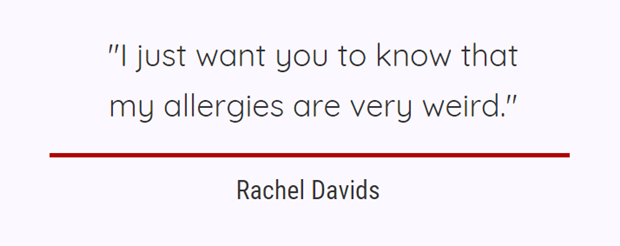Rachel Davids (not her real name), from South Africa, has a bewildering array of allergies, most of which do not make sense to her.
Rachel is allergic to sodium benzoate and sulphur dioxide – chemical substances widely used as food preservatives, as well as in medicines. She is also histamine intolerant.
A previous Health24 review states that sodium benzoate is commonly found in soft drinks and fruit juices, while sulphur dioxide can be found in dried sausage and boerewors, hamburger patties, certain sauces, beer and wine.
“I just want you to know that my allergies are very weird. Most of it almost doesn’t make sense,” she said.
Davids told Health24:
“I don't know why I have these allergies, because older people (50+) are more prone to histamine intolerance. But I was told that my mast cells (a type of white blood cell) produce too much histamine – causing my body to overreact when I have an allergic reaction. Normal people would take an antihistamine. I usually take cortisone.”
She began reacting to certain foods in 2011 – when she was in Grade 11 – resulting in intensive skin reactions. After many consultations, her GP was not able to pinpoint the cause of her skin reactions or what she was allergic to.
“I’ve passed out in the shower after having eating something I wasn’t supposed to at the supper table.”
For three years Davids has been following low histamine, sodium benzoate and sulphur dioxide diets.
“It is a lot like being a diabetic – you have to manage your histamine intake as they would manage their sugar intake,” she said.
It's awkward every time I visit people
“People don’t really understand how and why it’s possible to be allergic to so many things, so it became very uncomfortable visiting people or going to social gatherings because I can’t eat the foods.”
“Fortunately, my family has adapted to my diet and do everything they can to make things more comfortable for me.”
Managing the allergies
Davids visited an allergist in 2013 who conducted various blood, skin, breathing and lung function tests.
“I got cortisone injections, but as soon as I came to university (in 2013) I stopped getting the injections, and my allergies got worse.
“Now I always keep cortisone with me and many of my close friends/family members also keep it with them in case of emergencies. Along with that, I have to take antihistamine medication daily,” she said.
What is histamine?
Histamine is a chemical which occurs naturally in certain foods. It is also one of the chemicals that are released in the body as part of an allergic reaction, causing the typical itching, sneezing, wheezing, swelling allergy symptoms.
Histamine intolerance (HIT)
In her book, What HIT Me? Living with Histamine Intolerance, Genny Masterman points out that very few people are aware of HIT. We all have an enzyme that breaks down any histamine we absorb from histamine-containing foods, so it doesn't affect us.
However, some people have a low level of this enzyme, and when we eat too much histamine-rich food, they may suffer "allergy-like" symptoms such as headaches, rashes, itching, diarrhoea and vomiting, or abdominal pain. This is called histamine intolerance.
The HIT list
Foods that are rich in histamine include:
- Red wine
- Beer
- Cheese
- Brewer’s yeast
- Shellfish
- Fish
- Tomato
- Spinach
- Chicken
- Pork sausage
- Beef sausage
- Ham
- Chocolate
- Soy products
- Fermented vegetables
Who is at risk of developing allergies?
Genetic risk factors play a role in allergic reactions – the immune system meets an allergen and "samples" it to decide whether the allergen is harmful for the body or not, according to Associate Professor at the University of Cape Town and the University of Cape Town Lung Institute, Dr Jonathan Peter.
These people are genetically predisposed to having allergies (atopic disease). It is not specific to one gene but rather multiple genes. The immune system, once exposed to the allergen, will create allergenic antibodies to fight off the allergen, causing an allergic reaction, said Dr Peter.
“There is a 40% chance of a child having a certain allergy if one parent has allergies. This likelihood increases to 70% if both parents have allergies.”
Environmental factors also play a role. People in rural and farming areas are less likely to have allergies than people living in cities.
iStock
“This is a result of environmental co-factors like industrial pollution, production and presentations of food – people are more likely to have an allergic reaction to roasted peanuts than to raw peanuts, for example.“
How can people manage their allergies?
“Many people believe that if they or their child is genetically predisposed to certain allergies, there is no way to prevent it. This is not the case,” said Peter.
Pharmaceutical approaches – including medications and injections – to manage allergies would depend on the allergy itself.
Another approach is allergen immunotherapy. Peter describes this approach as giving small amounts of the allergen to the body over an extended period of time – usually at around three years. This aims to retrain the immune system not to make allergenic antibodies – that cause the allergic reaction – and instead make antibodies that favour the allergen.
Non-pharmaceutical approaches include behavioural changes and prevention strategies. People can reduce their reaction to certain allergens by decreasing their exposure to the allergen. This would include staying away from certain foods, like not eating peanuts for example. This approach also depends on the allergy itself.
Peter advises parents with allergies to consult with their GP when planning to have children. With guidance from their GP, parents can reduce the likelihood of the child having a certain allergy with approaches like introducing certain foods at certain times and staying away from others.
Read more:




 Publications
Publications
 Partners
Partners

















